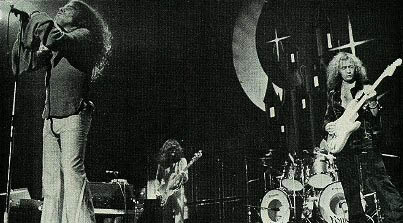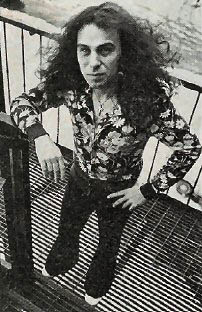|
Rainbow Rising RITCHIE BLACKMORE Gets It Up  "We've got The Rash from Stamford, Connecticut" reveals Mr. Ritchie Blackmore, "we've got Cozy Powell, the finest nonprofessional driver in England. Not to mention me, the Bagshot Bullet - we're the World's Top Band Without A Country." Between living in the California Sun, recording in German Studios, being managed by parties in both London and New York, you might say that Blackmore's Rainbow have that "International Feel."
"We've got The Rash from Stamford, Connecticut" reveals Mr. Ritchie Blackmore, "we've got Cozy Powell, the finest nonprofessional driver in England. Not to mention me, the Bagshot Bullet - we're the World's Top Band Without A Country." Between living in the California Sun, recording in German Studios, being managed by parties in both London and New York, you might say that Blackmore's Rainbow have that "International Feel."As for the new album Rainbow Rising (on MGM) - the first actual record featuring the group as a whole - you will find no split allegiances, lack of singular direction, or other divisive features. What you will find is straight-ahead rock music in the Ritchie Tradition. "Jon Lord loved it when he heard it," says Ritchie, speaking about his old companion from the Deep Purple days. "And Bruce Payne, our manager, thought it was the logical successor to Machine Head. You'll probably like it a lot. After all, it is the best thing I've ever done." "But Ritchie," Circus interjected, "isn't that what you told us last time?" "Well," said Ritchie rationally, "you always think you're bettering yourself. When you're in the studio you always think that it's the best thing you've ever done. It's only a matter of opinion, and I like my opinion. Everybody who's heard it thinks it's my best playing in a long while. I suppose that's a compliment. What do they know?" Rainbow Rising comes on strong in the visual department as well, packaged within a painting of a giant hand coming out of the ocean bringing forth a rainbow. "It looks a bit like something that would be done by Gustaf Doré," says Ritchie, "a famous French painter. It was done by a bunch of people, including the person who did the windows on Led Zeppelin's Physical Graffiti." Ritchie's a man concerned with such things, and the last album's cover was blown up as a backdrop for the band. "We'll be using this one on the tour as well, so we'll have two backdrops in addition to our Rainbow." Those who attended shows on Rainbow's first American tour can testify to the flash power and visual dynamics of their presentation. And as for the record itself. Mr. Ritchie Blackmore, ace reporter, interviewed lead singer Ronnie Dio about the contents of Rainbow Rising's lyrics, throwing in his own two cents all the while. The results of said discussion are as follows: Blackmore: "Tarot Woman" kicks off the album, something about a lump who reads cards, predicts the future and all this business. True? Dio: I recall it was originally called something else, but yes, that's the basic story behind "Tarot Woman." The main character is, told by this "Tarot Woman" that a chick is going to fuck him over; she tells him to beware a smile and a bright and shiny face. Ritchie, are you interested in this jazz? Blackmore: It scares me to death. . . but it's really true. Dio: It frightens me as well, I'd sink my faith into Palmistry. Blackmore: That's a fast rocker, but what about "Run With the Wolf?" Does that have anything to do with the Bad Company song of similar title? Dio: Certainly not, no Bad Company here. It is a heavy song set in a Transylvanian pub. Blackmore: I don't know what their song is about, and I don't know what ours is about either. Dio: I don't want to reveal any secrets, so let me merely quote a few lines, "In the light of the day/You can hear the old ones say/Was that sound last night the wind?/Can you feel the change begin?/By the fall of the snow a single soul will go with footsteps on the white/There's an unholy light/Something evil passing by/What's to come when the siren calls you go to Run With The Wolf." Not bad, huh? How would you characterize the next song, Mr. B.? Blackmore: "Starstruck" is a mildly amusing tale. It's all about this lump named Muriel who's been following me all around Europe for the past few years, a real lunatic. We play a concert in Paris and she'd be there without fail, then we'd fly to Lyon and she'd be at the airport waiting for our plane to arrive. One day I looked outside my window and thought I saw one of my bushes move through my garden. I kept watching, and sure enough she'd found my house so I set my dogs on her. They're not mean or anything, just scary. One tried to have a go at her just as we pulled them away. And that's only the second to the last song on side one.  Dio: Lest we not forget the 2 minutes and 59' second song closing out the side which puts, the rhetorical question, "Do You Close Your Eyes (When You're Having A Go) ?"
Dio: Lest we not forget the 2 minutes and 59' second song closing out the side which puts, the rhetorical question, "Do You Close Your Eyes (When You're Having A Go) ?"Blackmore: And do you, Our Dee? Dio: Err . . . I do. Blackmore: I've been told by several people that it should be the single. It's got that hook that the postman can whistle as he does his rounds. It's a very simple rock tune that the public'll take to, although it's not wholly representative of where the band is at. Then again, side two is comprised of two nine-minute tracks, and I'm not sure that this is where the band is at either. Dio: And which songs are these, pray tell? Blackmore: Who's interviewing who, small fry. "Stargazer" features a 42-piece orchestra, mellotrons, and a string thing all playing this half Turkish scale. This is my favorite track of the lot. Then there's "Light in the Black," very fast rock & roll -about nine minutes of madness and solos. The drums are heavy-sounding, in fact they are all through the album. What the hell are those lyrics about, Mr. D.? Dio: "Stargazer" is written from the standpoint of a slave in Egyptian times. He is serving The Wizard, who observes the skies and stars and becomes obsessed with the idea of flying. The slaves are building a tower of stone so the Wizard can jump off the top and take to the air. Finally this Wizard, this Stargazer, attempts to fly and, of course, falls to his death. The slaves are released, and this is where the song "Stargazer" ends, and "Light in the Black" begins. The Wizard has died and the slaves are free, but all they've known all their lives is an allegiance to the Stargazer. They don't know where to turn or what to do until they see the "Light in the Dark." I think that about covers the album, Ritchie. Indeed it does. As stated previously in the text, this is the first album by the group as such, for the last Rainbow album featured only Ritchie, Ronnie, and a cast of individuals quick to fade into rock & roll obscurity. The new members -Cozy, Jimmy and The Rash (Tony Carey)- have not only been able to jell as a band, but retain their distinctive playing styles as well. Cozy Powell (on drums) is perhaps the most famous of the new members, having made his reputation alongside Jeff Beck, Donovan, and Hot Chocolate as well as doing a top twenty single (worldwide) under his own name. "Cozy's worked out well," admits Ritchie, "we didn't do very much editing at all because he insisted on recording everything straight through. A lot of times a band will go into the studio and do a longer song in sections, because you can throw in everything you want knowing you only have to play 180 bars. If you do a long thing straight through, you worry about making a mistake and you tend to hold back. We only had one edit, which is quite astounding considering that side two has two nine-minute songs on it. "Cozy's a lot of fun. We go out racing on the throughway, Cozy drives while I watch out for the cops. This one time we were racing at 110 mph when I spotted a cop car, Cozy had us slowed down to 55 by the time we met. They stopped us, and we were all tense waiting for their reaction... they got out of their car, laughing, came over to us and said, nice brakes." The Rainbow Tour takes the group all over the U.S. of A., forty cities in two months, getting off just in time for Ritchie, Ronnie, Cozy, Jimmy, and Tony to catch their shares of bicentennial summer celebrations. It'll be rest and recuperation from hard playing and occupational diseases, this being a trek to rival those of Purple's Golden Days. "It's going to be a long, hard, silly tour," Ritchie bitches. "The bad thing about these tours is that after about 10 gigs all the equipment is broken, everybody's got to work twice as hard just to compensate for the technical problems, and you've still got 30 cities to play. If I have to put out extra it's tough enough, but if it's not going to look and sound any good regardless, that's a drag." Ritchie Blackmore, the eternal optimist - probably complains about the room service if his toast is a wee bit cold. Yes, it's a hard life for these ill-paid, downtrodden workhorses of the music industry who play Trilby by day and Galahad by knight. Yet, there are times when it all seems worthwhile. The band was off in Munich, recording, and during their free time they decided to go off iceskating. There was a band playing at the rink, and Ritchie's boys were skating around the rink when all of a sudden, one member of the group came upon a brilliant suggestion. As they rounded the bandstand, on Ritchie's cue they all leaped into the band pit, grabbed the instruments away from the musicians, and proceeded to run through a few numbers. "Everyone was shocked at first," Ritchie comments, "but most of them knew who we were -we're quite well-known in Germany- and they sat down and watched us play the 'Ice-Skating Blues.' We stayed up there for an hour, and then just handed the guitars back to the band, jumped into the rink and resumed skating. It's the first time I've played in ice-skates, and I must say it was enjoyable. Good fun." Indeed. © Jon Tiven, Circus, 1 June 1976 |